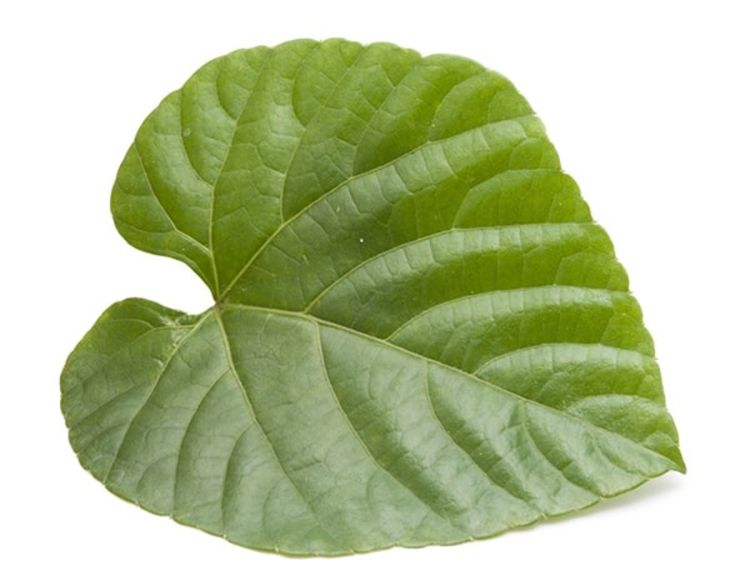BACKGROUND
Ingredient Type: Botanical, Extract
Also Known As: Tinospora cordifolia, Ambervel, Amrita, Gilo, Giloe, Giloya, Glunchanb, Heart-Leaved moonseed, Heavenly elixir, Indian tinospora, Jetwatika, Moonseed

Guduchi is a shrub native to India. It is a staple in Ayurvedic traditions and its roots, stems, and leaves have all been used medicinally for thousands of years. It is only just beginning to be available in the West. The name guduchi comes a Sanskrit word that means, “imperishable” (1).
TRADITIONAL USES
A growing number of studies support guduchi’s role as an adaptogen, a potent herb that increases the body’s resistance to stress, anxiety, and illness.
Guduchi has been used historically to:
- Alleviate allergies and symptoms of hay fever
- Ease arthritis, gout, rheumatic disorders, and inflammation
- Treat chronic skin disorders such as psoriasis or eczema
- Help with hepatitis and jaundice (helps protect the liver from exposure to toxins)
- Boost the immune system
- Prevent colds and flu
- Reduce the side effects of chemotherapy drugs (2)
Guduchi is used in health supplements today for its antioxidant properties and its ability to support the liver and the immune system.
WHAT DOES SCIENCE TELL US?
- The efficacy of Tinospora cordifolia (TC) extract in patients with allergic rhinitis was assessed in a randomized double-blind placebo-controlled trial. Seventy-five patients were randomly given either TC or placebo for 8 weeks. TC significantly decreased all symptoms of allergic rhinitis better than placebo (3).
- Guduchi appears to be radioprotective (4).
- Blood glucose levels decreased significantly in patients with moderate and severe diabetes who took guduchi extract for 3 or 15 weeks (5).
- Guduchi was found to possess anticomplementary and immunomodulatory activities (7).
- Tinospora cordifolia regulates cytokine and growth factors levels in the blood of the angiogenesis-induced animals (8). This indicates that it may be antiangiogenic.
- The water and ethanol extracts of stems of Tinospora cordifolia inhibit immunosuppression produced by cyclophosphamide (9).
- Oral administration of an aqueous guduchi root extract (TCREt) (2.5 and 5.0 g/kg) for 6 weeks resulted in a decrease in the levels of plasma thiobarbituric acid reactive substances, ceruloplasmin and alpha-tocopherol in alloxan diabetic rats (11).
- Guduchi exhibited strong free radical scavenging properties against reactive oxygen and nitrogen species as revealed by electron paramagnetic resonance spectroscopy, diminishing the expression of iNOS gene (13).
SAFETY
Although studies have shown no significant adverse side effects, guduchi may be slightly constipating if taken for long periods by those prone to sluggish bowels (1).
Side-Effects:
Guduchi can cause gastrointestinal upset when taken in large doses for long periods of time.
REFERENCES
- https://chopra.com/articles/what-is-guduchi
- https://www.webmd.com/vitamins-supplements/ingredientmono-1157-tinospora%20cordifolia.aspx?activeingredientid=1157&activeingredientname=tinospora%20cordifolia
- Badar VA, Thawani VR, Wakode PT, et al. Efficacy of Tinospora cordifolia in allergic rhinitis. J Ethnopharmacol 2005;96:445-9
- Goel HC, Prasad J, Singh S, et al. Radioprotective potential of an herbal extract of Tinospora cordifolia. Radiat Res (Tokyo) 2004;45:61-8
- Grover JK, Vats V, Rathi SS. Anti-hyperglycemic effect of Eugenia jambolana and Tinospora cordifolia in experimental diabetes and their effects on key metabolic enzymes involved in carbohydrate metabolism. J Ethnopharmacol 2000;73:461-70.
- Jagetia GC, Nayak V, Vidyasagar MS. Evaluation of the antineoplastic activity of Guduchi (Tinospora cordifolia) in cultured HeLa cells. Cancer Lett 1998;127:71-82.
- Kapil A, Sharma S. Immunopotentiating compounds from Tinospora cordifolia. J Ethnopharmacol 1997;58:89-95.
- Leyon PV, Kuttan G. Effect of Tinospora cordifolia on the cytokine profile of angiogenesis-induced animals. Int Immunopharmacol 2004;4:1569-75.
- Manjrekar PN, Jolly CI, Narayanan S. Comparative studies of the immunomodulatory activity of Tinospora cordifolia and Tinospora sinensis. Fitoterapia 2000;71:254-7.
- Nair PK, Rodriguez S, Ramachandran R, et al. Immune stimulating properties of a novel polysaccharide from the medicinal plant Tinospora cordifolia. Int Immunopharmacol 2004;4:1645-59
- Prince PS, Menon VP. Antioxidant activity of Tinospora cordifolia roots in experimental diabetes. J Ethnopharmacol 1999;65:277-81
- Prince PS, Padmanabhan M, Menon VP, et al. Restoration of antioxidant defense by ethanolic Tinospora cordifolia root extract in alloxan-induced diabetic liver and kidney. Phytother Res 2004;18:785-7
- Rawal A, Muddeshwar M, Biswas S. Effect of Rubia cordifolia, Fagonia cretica linn, and Tinospora cordifolia on the free radical generation and lipid peroxidation during oxygen-glucose deprivation in rat hippocampal slices. Biochem Biophys Res Commun 2004;324:588-96
- Rawal AK, Muddeshwar MG, Biswas SK. Rubia cordifolia, Fagonia cretica linn, and Tinospora cordifolia exert neuroprotection by modulating the antioxidant system in rat hippocampal slices subjected to oxygen-glucose deprivation. BMC Complement Altern Med 2004;4:11.
- Singh N, Singh SM, Shrivastava P. Immunomodulatory and antitumor actions of medicinal plant Tinospora cordifolia are mediated through activation of tumor-associated macrophages. Immunopharmacol Immunotoxicol 2004;26:145-62
- Stanely Mainzen Prince P, Menon VP, Gunasekaran G. Hypolipidaemic action of Tinospora cordifolia roots in alloxan diabetic rats. J Ethnopharmacol 1999;64:53-7.
- Stanely Mainzen Prince P, Menon VP. Hypoglycaemic and hypolipidaemic action of alcohol extract of Tinospora cordifolia roots in chemical induced diabetes in rats. Phytother Res 2003;17:410-3. View abstract.
See the WebMD entry for Tinospora cordifolia, the Examine.com entry for Tinospora cordifolia, the RXList entry for Tinospora cordifolia, the MedicineNet.com entry for Tinospora cordifolia, or the Drugs.com entry for Tinospora for more information.









